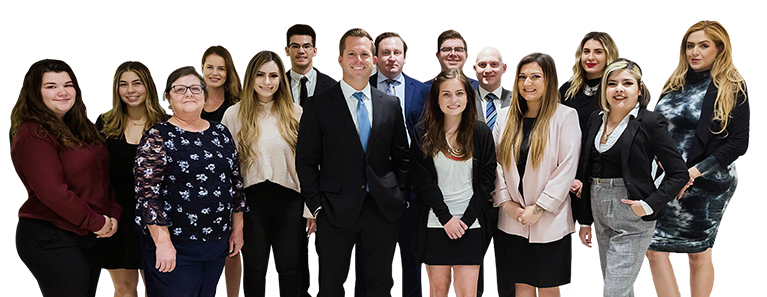What Are Some Common Childhood Disabilities That May Qualify for Social Security Benefits?
The Social Security Administration (SSA) has a list of disabilities that includes what the agency recognizes could make your child eligible for Social Security Disability. Of course, there is an arduous application process where you (as the parent) must prove that your disabled child falls within these categories.
You and your SSDI lawyer must have the documentation and provide medical (and possibly other) evidence from medical experts that your child has the disability and qualifies under the SSA’s guidelines.

As with any Social Security program, this can be a complex and challenging application process (as outlined by the Social Security Administration), and if you want it done right, you must have the help of a qualified, professional Social Security disability law firm.
However, once you go through this challenging process successfully, these Social Security disability benefits can be of valuable assistance to many families in paying for many needed items for your child. These items include food, clothing, medical equipment, and much more.
Additionally, if your child is eligible for SSDI, they may also qualify for Medicaid automatically, depending on the state in which you live. Additionally, you (as the child’s parent) may have to document what you use the Social Security benefits for.
Social Security benefits for your child can be used for a wide variety of conditions and disabilities, such as:
- Many forms of cancer – If you have a child living with various forms of cancer or leukemia, they may qualify if your family meets the income guidelines and has medical evidence of their impairment.
- Low birth weight and failure to thrive – Low birth weight (LBW) and failure to thrive (FTT) in infancy can indicate significant growth impairments.
- Respiratory illnesses and disorders – Respiratory disorders, like cystic fibrosis or chronic lung disease, are usually covered by Social Security benefits.
- Immune System Disorders – The SSA categorizes specific immune system disorders as HIV, autoimmune, and immune deficiency disorders, excluding HIV infection. If your child meets their qualifications, they may receive benefits.
- Digestive issues – Your disabled child may seek SSI eligibility for digestive conditions like hepatic dysfunction, inflammatory bowel disease, and malnutrition.
Numerous medical conditions may allow your child to receive SSDI benefits, and your skilled San Diego social security law team has the expertise and experience to ensure you and your child get the benefits you deserve.
What Are the Common Requirements for SSDI Benefits for My Disabled Child?
Always remember that every case differs, as do the covered conditions and possibly the application process involved.
That said, the usual dependent benefits that your child must meet include:
- Being your biological, adopted, or dependent stepchild.
- Being unmarried.
- Being under 18 or still enrolled in high school and under 19.
- Having a valid birth certificate and Social Security number.
- They can also be your grandchildren under specific conditions.
Grandparents raising grandchildren or step-grandchildren may also qualify these children for dependent benefits under certain circumstances.
This includes:
- If their parents passed away.
- If their parents have a qualifying disability that prevents them from working.
- They provide “regular support” for the child, usually at least half their financial support.
- The grandchildren lived with you for at least a year before they became entitled to SSDI benefits.
It’s also vital to note that as a grandparent, you may adopt your grandchildren and receive legal custody through the California courts. If the grandparent does this and follows their lawyers’ guidelines, most of the rules for children receiving benefits would apply.
Suppose the grandparents have legal custody of their grandchildren in California. In that case, the Social Security Administration will usually treat them and their qualifications for benefits as if they were their biological children.
How Long Could My Minor Disabled Child Receive Benefits?
If your minor disabled child still qualifies for and receives benefits, they will most likely continue to receive dependent benefits until the month before they are eighteen.
If your child is still in high school when they reach eighteen, then commonly, their benefits will continue until:
- They graduate from high school,
- They leave school before graduating.
- They leave school.
- Or they reach nineteen years of age.
When any of these events happens, it could trigger the halting of their benefits as a minor, but if your child remains dependent on you, they may continue to receive dependent benefits, but as an adult.
Always remember that this entire process is challenging. When your minor child approaches adulthood, you must fully consult the situation with a qualified, experienced, and empathetic Social Security Disability lawyer.

Once your child is an adult, it doesn’t necessarily mean anything changes regarding their benefits. However, many other rules and regulations may apply, and they may be able to receive a higher benefit than before. In any significant part of SSDI benefits for your child, the advice and guidance of your San Diego disability lawyer will be invaluable.
How Often May the SSA Review My Disabled Child’s Benefits?
If your child receives Social Security benefits, the Social Security Administration will require periodic reviews of your child’s medical condition to ensure that they continue to meet the criteria.
The SSA commonly performs this review at the following intervals:
- A minimum of every three years if your child is less than 18 and if their condition may be expected to improve.
- Babies receive benefits payments by age one because of their low birth weight.
First, never take these reviews lightly. During your review, you and your SSDI lawyer must provide solid evidence that your child’s disability still exists and continues to limit their daily lives and activities. Also, you must commonly demonstrate that your child receives proper medical treatment as instructed.
This is another area that your skilled Social Security disability lawyer’s preparation and attention to detail will be of great help in keeping and possibly increasing the benefits your child receives.
I Must Apply For Social Security Benefits for My Disabled Child; What Should I Do?
Having a child with any type of disability always puts an unwarranted burden on any family, one they take willingly and without hesitation. However, treatment for a special needs child can involve high costs, continuous care, medical treatment, and more.
The Social Security Administration provides ways for minor and adult children with disabilities to receive benefits to help their care and lives.

However, the system is challenging to navigate. If you want the best outcome for your child, you must enlist the advice, expertise, and guidance of a skilled and experienced San Diego disability lawyer.
The Social Security disability lawyers at Roeschke Law have a long-standing history of helping families of children with disabilities obtain the benefits they deserve. Call them today at (800) 975-1866 and get peace of mind knowing that your disability benefits case is in the best hands possible.














